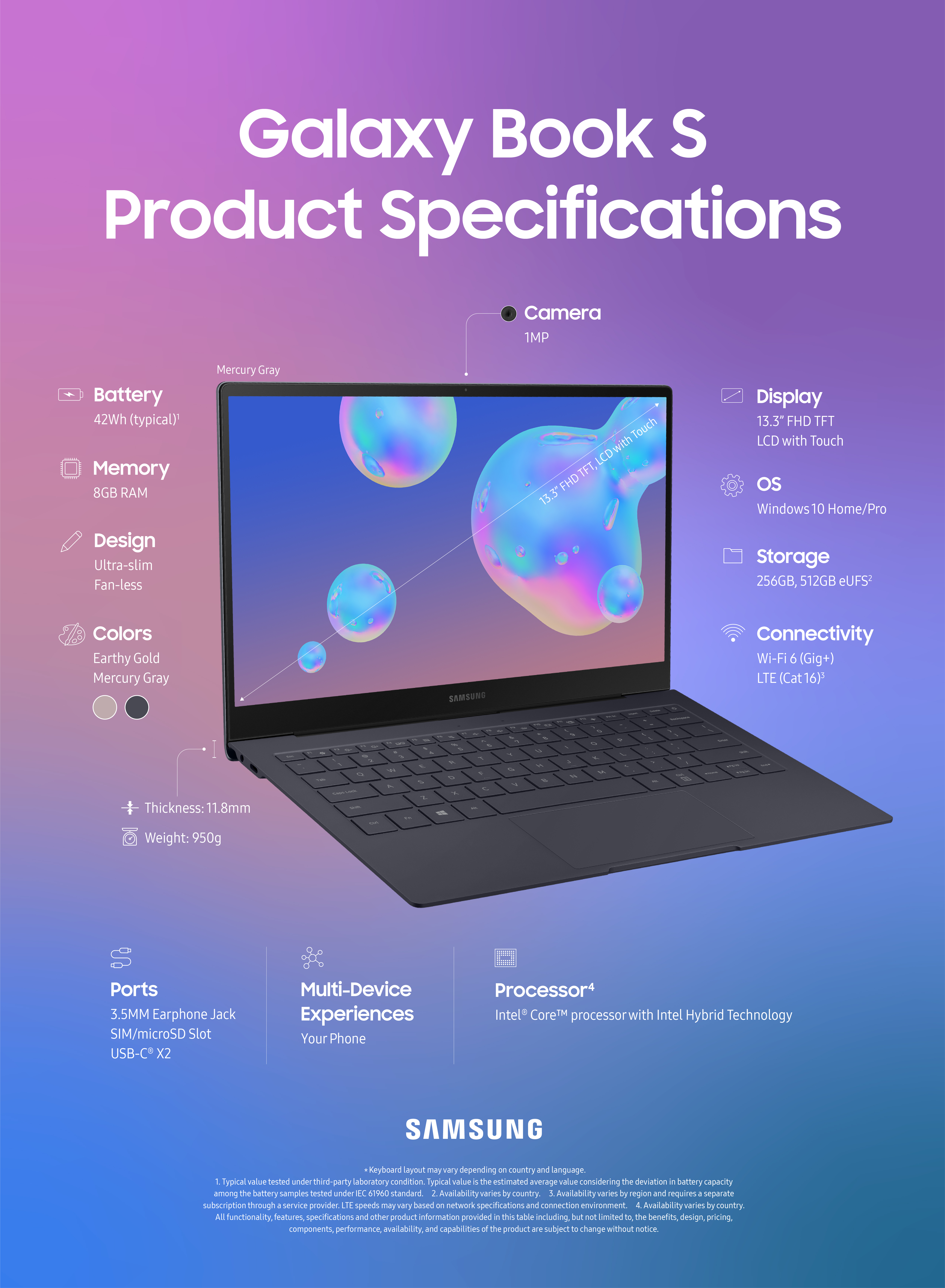Samsung Galaxy Book S Is First Intel Lakefield Laptop (Update)
The Samsung Galaxy Book S previously housed a Qualcomm processor.
Samsung announced today that the Galaxy Book S will be available with Intel Lakefield processors. The company has yet to release U.S. pricing and release dates, though the company's UK site has it shipping on June 12 for £999.00.
Update, May 29, 2:07 p.m. ET: Samsung told Tom's Hardware that this announcement is for the Korean market and that US details are unavailable. Story continues below.
The laptop will use an Intel Core i5-L16G7 CPU, which boasts Intel UHD graphics, Foveros 3D stacking technology for the first time and a hybrid CPU architecture.
Besides its first-of-its-kind processor, the Galaxy Book S will arrive with 8GB of LPDDR4X RAM and up to 512GB of eUFS storage. It will also come with Wi-Fi 6 and LTE options for connectivity.
The upcoming clamshell is light at 2.1 pounds and is just 0.5 inches thick. Samsung will offer the design in two colors: earthy gold and mercury gray.
Samsung Galaxy Book S Specs
| CPU | Intel Core i5-L16G7 |
| Graphics | Intel UHD Graphics |
| RAM | 8GB LPDDR4X |
| Storage | 256GB or 512GB uEFS |
| Display | 13.3-inch FHD Touch |
| Connectivity | Wi-Fi 6, Bluetooth 5.0, LTE |
| Ports | 2x USB Type-C, microSD card reader, headphone jack |
| Battery | 42Wh |
Samsung Galaxy Book S Is a Lakefield Showcase
The Galaxy Book S debuted with a Qualcomm Snapdragon 8cx, but this will be the first time we see Intel's five-core hybrid processor, which pairs one Sunny Cove core with four Tremont cores using Intel's 3D Foveros technology. Samsung's specification states that the Core i5-L16G7 offers clock speeds of up to 3 GHz and an L3 cache of 4MB.
We first saw Lakefield at CES inside the Lenovo ThinkPad X1 Fold, though Lenovo was careful not to name the chip specifically, only saying that it uses Intel Hybrid technology. Microsoft also suggested it would use Lakefield in the now-delayed, dual-screened, Surface Neo. So instead, Samsung got first dibs (though Lenovo plans to release the Fold this year). This laptop leaked earlier on a Canadian version of Samsung's website.
Enabling All Apps
Using an x86 chip over an Arm chip in the Galaxy Book S means Samsung's machine will support all Windows apps. If Samsung opted for an Arm chip and Windows 10 on Arm, 32-bit x86 apps would have to be emulated, and 64-bit apps wouldn't run at all. Some Windows programs have been compiled for Arm, but they're not all there yet. The Lakefield version of the Book S should offer far fewer limitations in that regard.
What is unclear until we test it is how the two will compare in terms of performance and battery life. But we hope to see this sleek laptop land in our lab soon.
Get Tom's Hardware's best news and in-depth reviews, straight to your inbox.

Andrew E. Freedman is a senior editor at Tom's Hardware focusing on laptops, desktops and gaming. He also keeps up with the latest news. A lover of all things gaming and tech, his previous work has shown up in Tom's Guide, Laptop Mag, Kotaku, PCMag and Complex, among others. Follow him on Threads @FreedmanAE and BlueSky @andrewfreedman.net. You can send him tips on Signal: andrewfreedman.01
-
The Wizzard Does nobody proofread this stuff any more? I'm sure the laptop is thicker than .5mm - How does one even get a typo like that?Reply
Second to that, don't you think it might have been worthwhile to also parade the uEFS 3.1 SSD? Not only is it quite a bit faster, it's also proprietary tech and rather novel - I'm willing to bet most readers won't know what uEFS is, nevermind how much better 3.1 is compared to 3.0.
Thirdly - Maybe the OS shouldn't just be hidden in the fine print? Might have been worthwhile to include that detail more explicitly in the writeup, instead of going on about compatibility with Windows apps.
